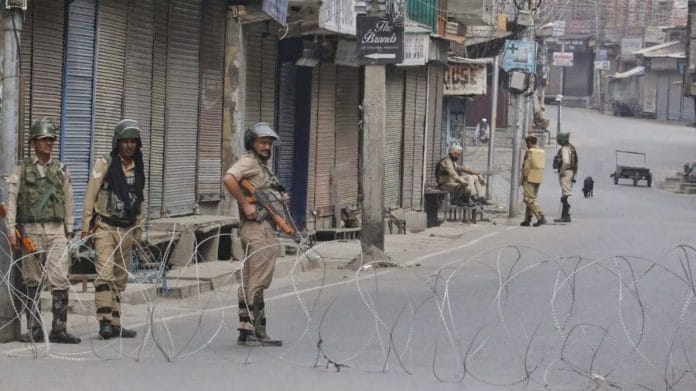Srinagar: In the absence of internet services in Jammu and Kashmir, militants have turned to “traditional modes of communication”, according to intelligence reports received by the J&K Police.
After an internet blackout was enforced in J&K ahead of the scrapping of Article 370 by the Narendra Modi government, militant groups operating in the Valley were initially relying on word-of-mouth communication, but are now using internet-enabled satellite phones, sources said.
Net-enabled satellite phones are like modern smartphones, but they connect directly to satellites instead of using mobile towers for internet access.
The police are now ascertaining the scale at which these satellite phones are being used. Official sources said the police have discovered net-enabled satellite phones being used in Kashmir on at least two occasions in the last two months.
Also read: An unintended effect of Modi govt’s Kashmir lockdown – militants caught in their own trap
Why militants switched to satellite phones
Before the arrival of mobile phones, Thuraya satellite phones were among the most preferred modes of communication among the militants.
According to senior security officials, use of the phones, called “Suraya” in militant parlance, diminished since services like SMS and mobile internet gave them an easier way to communicate with each other as well as their leadership in Pakistan.
“It is not that the militants had completely stopped using satellite phones. During many encounters, we recovered the devices. Security forces would also recover the devices from infiltrating militants as well. However the use of satellite devices had massively reduced over the years,” said a senior J&K Police officer, who did not wish to be named.
“There is a perception that some internet-based applications are safer modes of communication that can’t be traced. So, militants resorted to using these applications not only for passing messages but also sending coordinates of locations,” the officer said.
In the initial days of the communication blackout in Jammu and Kashmir, militant groups reportedly began relying on word of mouth to pass on messages. But the police officer said they are now getting “fresh inputs that the militant groups might now be using satellite phones again”, and that with the new net-enabled ones, “they can not only communicate with each other but also use the internet for multiple purposes”.
Also read: Kashmir anti-insurgency units to add strength to fight rising militant attacks
Decrease in counter-insurgency
However, other senior police officers told ThePrint that the internet ban had also directly affected the security forces’ intelligence-gathering mechanism, resulting in a decrease in counter insurgency operations.
According to police data accessed by ThePrint, a total of 154 militants were killed in gun battles across Kashmir in the first seven months of 2019. In the four months since the communication blackout, security forces killed 20 militants, including Pakistani nationals and Kashmiri locals.
“We are, however, using all means available to us to gather intelligence. For instance, in Srinagar, CASOs (cordon and search operations) had decreased in August and September, but in October, we conducted some search operations based on inputs we received,” another senior police officer said.
“As a result, there hasn’t been any credible sighting of militants in the heart of Srinagar since 15 October. On the outskirts, we tend to get reports of militant sightings, but once CASOs are conducted more routinely, the militants will not take chances to enter Srinagar.”
Ravideep Sahi, Inspector General of the Central Reserve Police Force, also said militants had been attempting to make inroads into Srinagar, but had failed to gain foothold.
Also read: J&K cops credit counter-insurgency ops that killed 388 militants for no violence since 5 Aug






